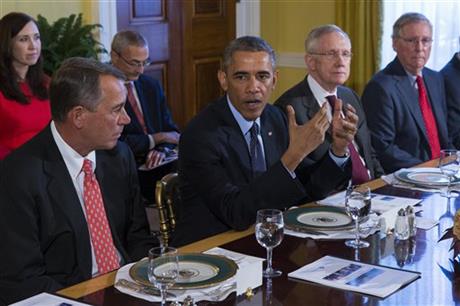
By NANCY BENAC
He hardly ever calls. When he does, it’s all business.
And that’s President Barack Obama’s vibe with top Democrats on Capitol Hill.
With Republicans, there’s even less chemistry.
But GOP congressional leaders don’t show much inclination to buddy up to the president, either.
When the president sits down with eight top legislators — four from each party — at the White House on Tuesday, there’s little expectation it will usher in a new era of comity and cooperation.
Republican leaders will head to the White House already peeved with the president for his recent veto threats and go-it-alone policy moves. Democratic leaders, now in the minority party in both chambers, will find themselves less relevant.
The White House is waving off any notion that the meeting is the start of a new congressional charm offensive.
“For anyone craning to hear the conversation through the walls, I wouldn’t expect a lot of laughter,” says Jim Manley, a former aide to Senate Democratic leader Harry Reid of Nevada. “It’s not the funniest group of people you’ve ever put together.”
Three thoughts on how Obama gets along with top Republicans and Democrats in Congress, and how much it matters.
___
THEY JUST DON’T CLICK
Although Obama was a senator from Illinois for four years before he became president, he never has had a strong rapport with members of Congress.
Legislators from both parties have grumbled for years that the Obama White House doesn’t reach out to them much or even pay enough attention to small gestures such as White House tour tickets or Christmas cards.
“That’s been missing for the whole time the president’s been in office,” says former Rep. Steve LaTourette, R-Ohio.
Occasional attempts by the White House to change that dynamic — by inviting key legislators to dinners or the like — typically have faded fast.
Obama’s first golf game with House Speaker John Boehner, R-Ohio, came about only after the president had been pestered relentlessly about why he hadn’t invited a fellow lover of the game to tee off. The outing was never repeated.
Last week, the No. 2 Republican in the Senate, John Cornyn of Texas, told a home state newspaper he never had gotten a call from the president, “which is kind of amazing to me.”
Boehner and Senate Majority Leader Mitch McConnell, R-Ky., took it as a poke in the eye for the White House to issue veto threats just as lawmakers were taking the oath of office for the new Congress.
“He could have waited a few hours,” the speaker groused.
While Obama has a “rock-solid” relationship with Reid, Manley says, even they aren’t particularly chummy.
“Everybody jokes about Reid and his nasty habit of hanging up the phone as soon as he’s done with his end of the conversation, but the president’s not much better,” Manley says. “There’s not a lot of idle chitchat.”
White House press secretary Josh Earnest dismisses the intense interest in Obama’s chemistry with congressional leaders. “We’re focused a little less on sort of the charm and more on the substance,” he says
___
RELATIONSHIPS MATTER …
Trust and good will lubricate the legislative process and any negotiations between the Capitol and the White House.
It’s possible to do a deal without them, but it’s a lot harder.
California’s Nancy Pelosi, the top Democrat in the House, credits Obama for going overboard to try to build positive ties with the GOP.
“The president has always extended the hand of friendship,” she says. “Some say too much.”
But plenty of legislators from both parties talk wistfully about the presidency of Democrat Lyndon Johnson, who was unafraid to tangle, cajole and horse-trade with legislators to translate big ideas into law.
Cornyn describes Obama, by contrast, as “so detached and disengaged and apparently disinterested in doing the grind work that goes along with passing legislation that it would be hard to do anything.”
As for the trust factor, LaTourette says both Boehner and Obama carry the scars of failed budget negotiations from 2011, in which “both men honestly believe that the other one sort of double-dealt them.”
Such misgivings can loom large in the final push to seal a deal.
“In any business, it’s easier to negotiate when there is a personal relationship and a level of trust,” says Brian Walsh, a Republican strategist and former congressional aide. “That may not necessarily exist in this situation.”
Obama and McConnell, while not chummy, at least seem to know what they can expect from one another.
“This is certainly not the kind of interaction, back and forth, that you would expect in a normal circumstance,” Sen. Bob Corker, R-Tenn., says of the president and the new majority leader. “But yeah, they have a relationship. In times past, when there’s been a major ox in the ditch they’ve been able to work through it.”
Corker’s takeaway from all the recent fireworks: “I wouldn’t write this year off.”
___
… BUT MAYBE NOT THAT MUCH
It’s always nice to get along, but voices from both Congress and the White House caution against attaching too much importance to the idea.
“People read way too much into personalities and all that stuff,” says Corker. “Despite what the American people think, there are a good many adults up here that understand that regardless of how you may feel personally about a situation, we have a job to do.”
Obama himself seems to subscribe to that notion.
Last spring, the president pointed back to those failed budget talks from 2011, and that infamous golf game:
“I like Speaker Boehner personally, and when we went out and played golf we had a great time. But that didn’t get a deal done.”
___
Associated Press writer’s Matthew Daly and Connie Cass contributed to this report.



